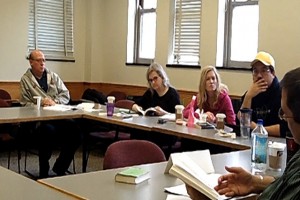 The function of the university is not simply to teach bread-winning, or to furnish teachers for the public schools, or to be a centre of polite society; it is, above all, to be the organ of that fine adjustment between real life and the growing knowledge of life, an adjustment which forms the secret of civilization. – W.E.B. DuBois, The Souls of Black Folk
The function of the university is not simply to teach bread-winning, or to furnish teachers for the public schools, or to be a centre of polite society; it is, above all, to be the organ of that fine adjustment between real life and the growing knowledge of life, an adjustment which forms the secret of civilization. – W.E.B. DuBois, The Souls of Black Folk
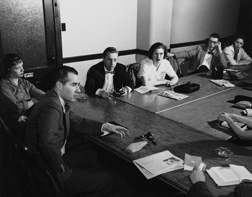 Solitary reading will enable a man to stuff himself with information, but without conversation his mind will become like a pond without an outlet — a mass of unhealthy stagnature. It is not enough to harvest knowledge by study; the wind of talk must winnow it and blow away the chaff. Then will the clear, bright grains of wisdom be garnered, for our own use or that of others. – William Mathews
Solitary reading will enable a man to stuff himself with information, but without conversation his mind will become like a pond without an outlet — a mass of unhealthy stagnature. It is not enough to harvest knowledge by study; the wind of talk must winnow it and blow away the chaff. Then will the clear, bright grains of wisdom be garnered, for our own use or that of others. – William Mathews
The Basic Program of Liberal Education for Adults
The Basic Program of Liberal Education for Adults is a unique four-year, non-credit course offered by the University of Chicago Graham School of Continuing Liberal and Professional Studies (in which I have had the privilege to teach since 1993). As the Autumn 2012 Basic Program Quarterly puts it:
 Curriculum
Curriculum The program is based on the original Core Curriculum for undergraduates at the University of Chicago. Basic Program students take the entire four-year curriculum in order, progressing with their classmates from quarter to quarter and year to year.Instructors
The instructors are accomplished scholars and skilled discussion leaders, and most of them have 10–30 years of experience teaching in the program. Instead of lecturing, they use the Socratic method of discussion to create a structured yet flexible format for students to digest and think critically about each new work.
Courses
In years 1–4, each course is 10 weeks long and meets once per week. Each session is divided into two parts and has a different instructor for each part. Tuition covers both parts of each course, tutorial and seminar.
- The instructor for the 90-minute tutorial leads an in-depth analysis of one or two texts for the entire quarter. (For example, in Autumn Quarter the Year 1 students will read Plato’s dialogue the Meno .)
- The 90-minute seminar moves at a faster pace, covering three or four texts during the quarter. (For example, in Autumn Quarter the Year 1 students will read Antigone by Sophocles, the Apology and the Crito by Plato, and Crime and Punishment by Dostoevsky.)
Alumni Courses
Alumni courses are open to students who have completed at least two years of the curriculum. These courses are an integral part of the intellectual life of the program. Hundreds of students who have completed the program enroll in alumni courses to stay in touch with the vibrant intellectual community ofthe Basic Program.
Courses Open to All
Every quarter some courses are Open to All, with no prerequisites. During Summer Quarter, all Basic Program courses are Open to All.
Basic Program 70th Anniversary Celebration (November 17, 2016)
Group Therapy with Great Books: On the Remaking of Adults through
Lifelong Adult Re-Education (September 2, 2016)
The Mission of the Basic Program of Liberal Education for Adults:
A Personal Statement by Adam Rose
Although The Basic Program has never had an official “Mission Statement”, in 1996 I drafted the following “mock” mission statement as a way of distilling the results of a year of research into the program’s history conducted in preparation for the 50th anniversary of the program’s founding. It thus represents my own best understanding of what The Basic Program has been and aspired to be. The name of the University of Chicago’s continuing education division has been updated to its current name.
Established in 1946 by Robert Hutchins and Mortimer Adler as the first institutional expression of the “Great Books Movement”, the Basic Program of Liberal Education for Adults is the oldest program of the Graham School of Continuing Liberal and Professional Studies, the continuing education division of the University of Chicago.
The mission of the Basic Program is threefold. First and foremost, it is to assist adults in their ongoing personal and civic self-development by facilitating critical, collaborative, first-hand engagement with great works of the mind.
Basic Program regular curriculum classes facilitate this engagement through a structured introduction to some of the great works of the Western textual tradition. Alumni and summer classes facilitate this engagement through in-depth explorations of these same and other works as well as through structured introductions to, and in-depth explorations of, some of the great works of non-Western textual traditions and non-textual traditions of all kinds.
Always of the highest-possible intellectual integrity and pedagogical quality, Basic Program activities are primarily intellectual, highly empowering, and uniquely pleasurable. Moreover, by their very nature, they connect participants to two significant communities: the historical community of tradition(s) and the contemporary community of like-minded individuals. In an important sense, therefore, this aspect of the Basic Program’s mission amounts to being, and making widely accessible, a vital community comprising great works of the mind on the one hand, and individuals actively enhancing the quality of their lives and their society through their ongoing critical, collaborative, first-hand engagement with these works on the other.
The second aspect of the Basic Program’s mission is to assist in the ongoing professional development of its teaching staff. As “specialized generalists” and the nucleus of the Basic Program community, Basic Program instructors strive for expertise and excellence in facilitating, authorizing, and modelling critical, collaborative, first-hand engagement with a wide variety of great works of the mind. Among other things, junior instructors are oriented to the Basic Program’s mission and helped to develop expertise in both the material taught and the methods of teaching, while senior instructors are helped to remain “fresh” and open to new possibilities in these same regards.
The third aspect of the Basic Program’s mission is to contribute to the missions of the University of Chicago and the Graham School of Continuing Liberal and Professional Studies by operating in a financially sound manner and by actively employing the Program’s comparative advantages for the University’s and School’s benefit. In particular, the Basic Program: visibly promotes the University’s values of respect for learning, scholarship and informed citizenship and makes the diverse resources of the University visible and available to other institutions and the general public (as well as vice versa); develops and strengthens ongoing relationships between the University and other institutions and the general public and thus increases the University’s impact on the them and their appreciation of and support for the University; and provides teaching and teaching development opportunities to graduate students of the University.ariety of great works of the mind. Among other things, junior instructors are oriented to the Basic Program’s mission and helped to develop expertise in both the material taught and the methods of teaching, while senior instructors are helped to remain “fresh” and open to new possibilities in these same regards.
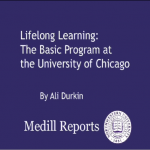 Profile of The Basic Program
Profile of The Basic Program
The video report “Lifelong Learning: The Basic Program at the University of Chicago” by Ali Durkin appeared as part of “Baby boomers bring new meaning to the term lifelong learner” by Ali Durkin in Medill Reports, 6 March 2012.
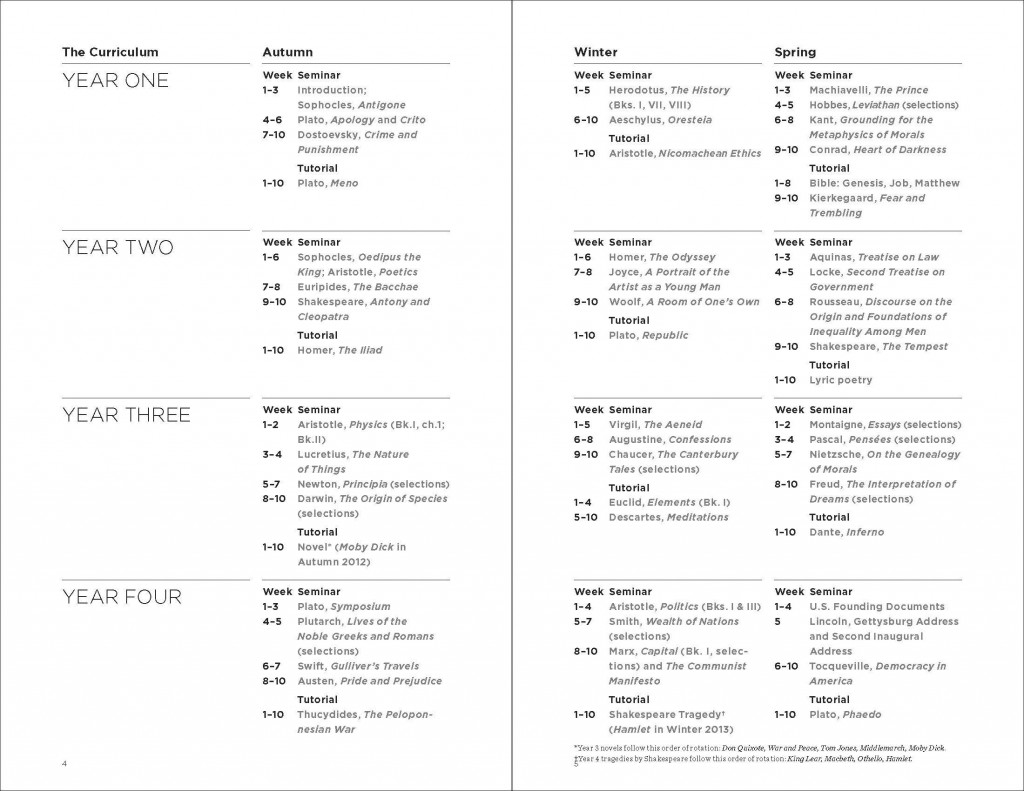
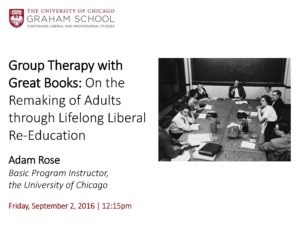
You must be logged in to post a comment.